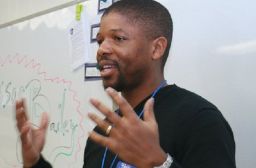Editor’s Note: Issac Bailey is an interim member of The Charlotte Observer editorial board and the 2016 James K. Batten Professor of Public Policy at Davidson College. He was a 2014 Harvard University Nieman fellow and is the author of the forthcoming book “My Brother Moochie: Regaining Dignity in the Midst of Crime, Poverty, and Racism in the American South” (Other Press). Follow him on Twitter: @ijbailey. The views expressed are his own.
It’s not easy to predict who will murder someone – or to stop them, even when you respond to the “warning signs.” I know from first-hand experience.
My family has gone through multiple times what the family of Nikolas Cruz will be going through in the coming days – being scorned by those wondering why they didn’t know he was allegedly about to kill 17 people and swallowing the shame that loved ones of those who commit awful acts are frequently forced to hold inside them.

I have eight brothers, two sisters and a handful of cousins and nephews who were raised like siblings. My oldest brother spent 32 years in prison for first-degree murder. I have another brother who is serving a 16-year-sentence for his role in an armed robbery that ended in a shooting death. A nephew who was raised in my family like a brother was sentenced in the same crime and is serving 25 years.
Last year, another brother began a 24-year federal sentence after agreeing to a plea deal on charges including voluntary manslaughter, armed robbery and kidnapping.
That’s why I know what President Donald Trump tweeted Thursday morning, and what others are arguing, makes sense only to those who have never experienced what families such as mine have.
“So many signs that the Florida shooter was mentally disturbed, even expelled from school for bad and erratic behavior,” Trump tweeted. “Neighbors and classmates knew he was a big problem. Must always report such instances to authorities, again and again!”
Conservative writer David French made a similar argument.
“When policies fail, people can and should rise to the occasion. Looking at the deadliest mass shootings since Columbine, we see that the warning signs were there, time and again. People could have made a difference,” he wrote.
French continued: “We’ve trained ourselves to mind our own business, to delegate interventions to professionals, and to ‘judge not’ the actions of others. But in a real way, we are our brother’s keeper; and an ethic of ‘see something, say something’ is a vital part of community life.”
In my family, we didn’t mind our own business. We knew we were our brother’s keeper. We responded aggressively to every warning sign – and still we could not keep my brothers from hurting others. We did everything people like French and Trump say we must.
We got them help. My mother took my oldest brother to school counselors and psychiatrists and implemented corporal punishment and took away privileges and gave him hugs and encouragement and prayed – God, did she pray – everything she could think to do, and still he ended up stabbing a man to death.
From an early age, we intervened in the lives of my youngest brothers to ensure they didn’t follow my oldest brother’s path. We emphasized the importance of education. We made sure they were in the church and knew God and Jesus. We provided them positive role models, including brothers and sisters who attended major universities, started businesses and raised successful children of their own. We took them into our homes in multiple cities to get them away from a negative element in our hometown. We took them to counselors and psychiatrists. We even called the authorities – multiple times – when we grew concerned they might do something awful.
And still, I had to rush home after receiving a late-night call that my brother’s girlfriend had been murdered in a drive-by shooting, a bullet meant for my youngest brother hitting her instead. I forced my brother to get into my truck. I drove him to the police department and told him to tell everything he knew about the potential assailants. I was afraid it was the beginning of another cycle of violence in our small town, afraid he might think it best to retaliate in kind, still hoping that being spared from the bullet she took would make a difference. No matter. Over the intervening years, I found myself in state and federal courtrooms watching prosecutors arguing he should be given a long prison sentence for things he did even after his girlfriend’s death.
Don’t tell me about warning signs. Don’t lecture me about how we’ve supposedly delegated our responsibilities to others. Predicting human behavior is among the most difficult things to do. Predicting who will commit violence – before the violence is committed – is even more difficult, especially given that many people who “show signs” never pick up a gun or knife. It is more impossible, still, when the person showing signs is someone you love, someone you’ve seen smile and heard laugh, someone you’ve cried with joy for, someone whose diapers you’ve changed. The supposedly easily connectable dots only seem connectable after the deed has been done.
Join CNN live
What’s worse is that families such as mine are then shamed into silence for having failed to do the impossible, prevent the kind of tragedy even trained professionals have difficulty spotting in advance. Cruz apparently left signs as well. And he still ended up allegedly killing 17 people.
Maybe it’s time to stop asking the families of disturbed people to do the impossible and instead get serious about changing a culture that is saturated with guns. We won’t be able to prevent every tragedy. But we damn sure can lower the body count by making it harder for so many to so easily attain weapons designed to produce mass death.



